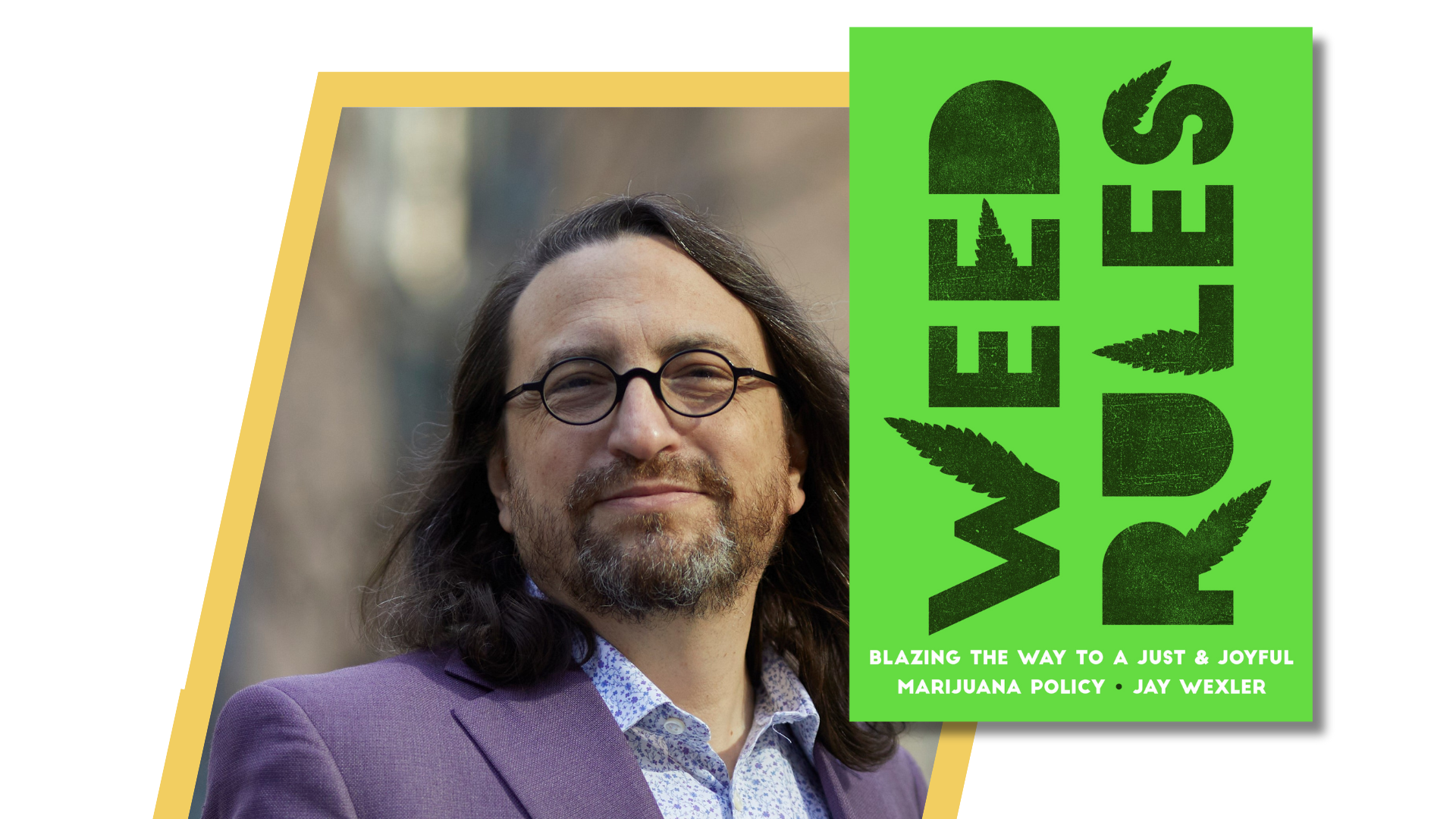Sparking Joy in Cannabis Policy
Professor Jay Wexler proposes states adopt a “careful exuberance” approach to cannabis legalization.

Sparking Joy in Cannabis Policy
Professor Jay Wexler proposes states adopt a “careful exuberance” approach to cannabis legalization.
The Record spoke with BU Law Professor Jay Wexler about his recently published book, Weed Rules: Blazing the Way to a Just and Joyful Marijuana Policy (UC Press 2023), which suggests a new approach to cannabis policy that focuses on promoting equity and recognizing the benefits of cannabis.
Listen to an unabridged version of the interview:
Q&A
The Record: The book explains how “focusing on joy and community can lead us to an equitable marijuana policy.” And your Twitter account, @SCOTUSHUMOR, catalogs each occurrence of a Supreme Court justice laughing. What impact do you see on policy and the legal world when presenting these lighter, more positive emotions?
The Supreme Court humor was a brief, spark of an idea that somehow has come to characterize my entire career. People think it’s fun. It’s not really necessarily trying to get at anything other than trying to make people realize that Supreme Court justices are human beings.
In terms of the joy in cannabis, it seems very common sense, but also not typically recognized that happiness can be a legitimate goal of public policy. Why not? If there are two policies out there, one of which is going to promote joy amongst the population and the other isn’t… Wouldn’t you want the policy that brings joy to people to be the one that’s adopted by the government?
And if I have to be that guy to remind people to keep joy in mind, I’ll do that. That’ll be my role.
The Record: The criminalization of cannabis has long targeted people of color, from the war on drugs through continued incarceration and loss of employment. How do you balance “joy” with the racist effects of cannabis law in our country?
You can’t tell the story of cannabis illegality without recognizing that the history of cannabis prohibition has been racist, both in its origins in the 1930s, and then also in the 1970s, with [President Richard] Nixon. The enforcement of cannabis laws has also been racist. And that continues to this day.
Black people have a four times greater chance of being arrested for a cannabis offense than white people—across the country.
It’s absolutely critical that marijuana policy in this post-legalization nation takes steps to right those wrongs of the drug war. They go together: you certainly can’t have joy if theres discrimination in the law.
The Record: Where have you seen the enactment of your proposed “careful exuberance” attitude toward cannabis policy be effective?
There are about 25 licensed lounges in the United States. And there are some states which have passed laws to protect employees by prohibiting companies from firing somebody for using cannabis outside of work. Those places are examples of careful exuberance.
But advertising is restricted everywhere. Marketing the products and stores is where you would see the celebration of cannabis in the culture.
However, sports betting commercials show people freaking out about winning. Don’t get me wrong: I love sports and gambling. But it’s very striking the difference between how cannabis can be advertised and how sports betting can be advertised.
There’s no one place that exemplifies the careful exuberance altogether.
It’s absolutely critical that marijuana policy in this post-legalization nation takes steps to right those wrongs of the drug war. They go together: you certainly can’t have joy if theres discrimination in the law.
The Record: You have shared the ways in which you personally demonstrate the normalization of cannabis use. Does the stigma associated with cannabis use impact potential career paths in other areas of the law?
I’ve been teaching this course for six years, and when I first taught it, nobody talked about their cannabis use. A student pointed out halfway through the semester, “Were all talking about cannabis, but nobody wants to say whether they use it or not.” It was an interesting moment.
Students who select to take the class are comfortable with talking about cannabis, but they are rightfully concerned about job prospects with the federal government. As far as I know, people who have tested positive for cannabis use are frowned upon by the federal government, if not turned away.
The stigma is definitely there. And it’s another good reason for policy to move in the direction of exuberance rather than tolerance so that we don’t have people excluded from important, needed legal jobs because they use cannabis. Which is just crazy.
The Record: In researching for your book, was there anything that surprised you?
When I first started teaching cannabis law, I did not know much about the racist origins. In the early part of the 20th century, the criminalization of cannabis was driven by one awful guy and picked up by lots of other awful people. I think everybody should know that history.
People might not recognize the various ways that federal illegality continues to affect the industry and use of cannabis. Most banks are afraid of violating money laundering and Bank Secrecy Act laws, so they don’t service cannabis companies. Federal tax law results in extremely high tax rates for cannabis businesses because they can’t deduct the cost of doing business except in a very limited way.
You can’t legally use pesticides on cannabis crops because the EPA doesn’t see cannabis as a real crop. Also, if a company goes insolvent, they can’t rely on federal or state bankruptcy law. Veterans often can’t access cannabis, because VA doctors are not allowed to recommend it. Immigration, family law… there are cases where people lose custody because they smoke weed.
I bet some of that will be surprising to readers to learn how many tentacles the feds have on the industry. Even if it’s legal at the state level, it’s not really legal.
The Record: Do you have any projections regarding the future of cannabis law?
I don’t have any prediction about the legislature. The Safe Banking Act, which would have allowed banks a safe harbor to ban cannabis companies, has not passed.
Watch the courts in the next couple of years because there will be a series of constitutional challenges to state laws that prohibit the export or import of cannabis from other states. Those kinds of laws, if they were in any other industry, would be clearly unconstitutional under the Dormant Commerce Clause, which prohibits states from regulating interstate commerce to protect their own industries and their own employees.
Since the beginning of cannabis legalization in the states, it has been assumed that the federal illegality means that this part of the Constitution does not apply. If the cases go to the Supreme Court, I could see a decision that says the states can’t regulate interstate commerce in cannabis, which would mean that there would be de facto interstate commerce for cannabis, even without federal legalization.
I would say watch what the courts are doing.
